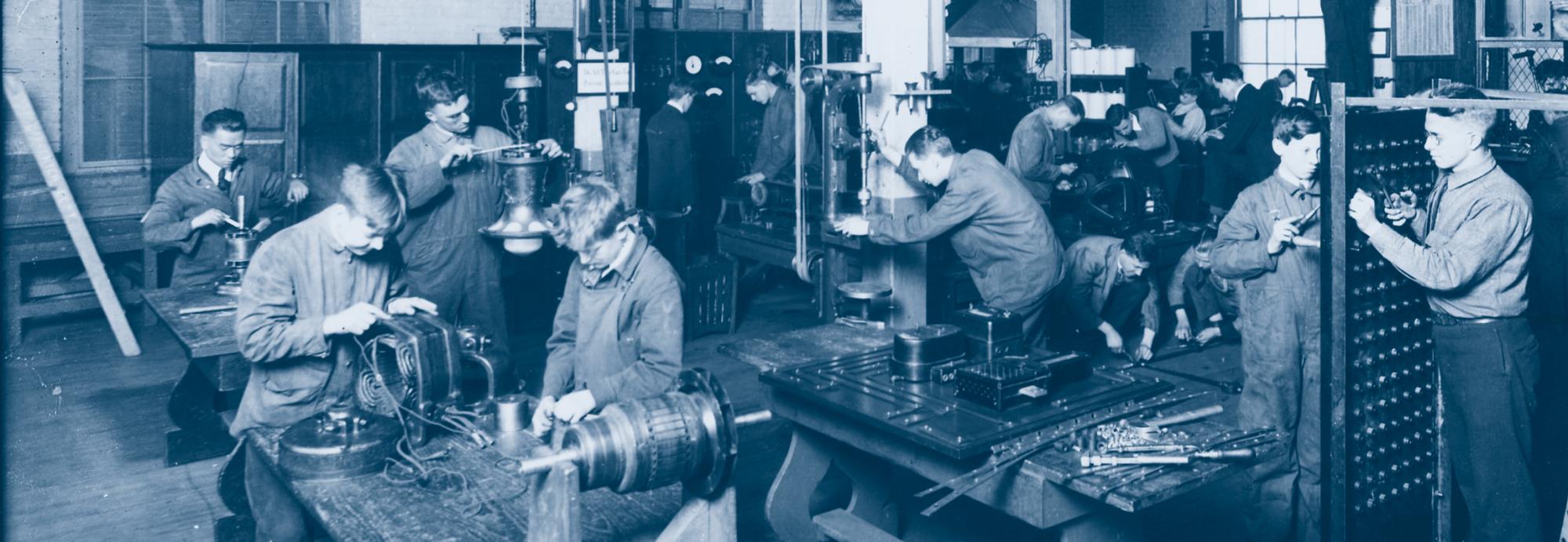Vocational & Secondary Schools
Application Guidelines
Grant Focus
Throughout his life, George Alden evidenced a keen interest in industrial, vocational, and professional education. He studied innovations in this country and abroad and gave of his time to serve on school boards in his community of Worcester. The Trustees focus their grantmaking on the capital needs of vocational and independent secondary schools in the immediate Worcester area. The Trustees primarily make outright grants, but will issue challenge grants with the goal of helping an institution generate increased and broader philanthropic support from its constituencies.
Intervals between Applications
The Trust policy is not to consider grant requests more frequently than three years from the date of the last grant or one year from the date of the last payment, whichever is later. An institution whose proposal has been rejected may normally be eligible to apply again after one year.
Schedule of Distribution Meetings
The Trustees consider proposals at four distribution meetings a year. Complete, hard copy proposals for the March, June, September, or December meetings must be received by the fifteenth of the month prior to the meeting (e.g., February 15 for the March meeting).
Note: The Trust does not accept electronic proposals.
Proposal Requirements
-
A summarizing cover letter, which includes the requested amount, signed by the Head of School and, in the case of vocational education, the Superintendent of Schools. It is expected that the project for which funding is requested is among the school’s highest priorities.
-
The name, telephone number, and email address of a contact person
-
The proposal, in brief narrative form, should help the Trustees understand the purposes to be achieved through the grant, the reasons why the proposing institution is capable of achieving those purposes, and specific information about the educational components of the project. In addition, the Trustees want to know how the grant will positively impact the school’s students and faculty and help the school fulfill its mission.
-
A project revenue and expense budget and implementation timetable
-
Fundraising goals, success-to-date for the project, and specific plans for raising the remaining funds needed
-
The school's mission statement
-
Summary of the school’s strategic plan with progress achieved to date, and its key strategic priorities (up to three) going forward
-
If the project is part of a capital campaign, information about the volunteer leadership
Required institutional information
Three-Year Trends in Chart Form
-
Total enrollment (Fall of the most recent 3 years, domestic and international students reported separately)
-
Measures of achievement for incoming students
-
Application/admit/matriculation numbers
-
Gender mix
-
Minority representation
-
Percentage on need-based financial aid, if applicable
-
Tuition-room-board charges, if applicable
-
Median scores on applicable required measures, e.g., MCAS
-
Percentage of students in each academy (vocational school only)
-
Percentage of senior class accepted to college
-
Endowment amount, investment return, and annual draw policies and practices
-
The total amounts raised in annual (unrestricted) and capital campaigns (each reported separately) from all sources in a given year.
-
The percentage of trustees that make a gift to both annual and capital efforts, or to one or the other. (Expected total would be 100%)
-
Participation rate of alumni giving to annual fund each year
Attachments
-
Summaries of the two most recent fiscal year operating budgets and the next fiscal year board-approved operating budget, if available (with explanation, if in deficit)
-
Copies of the audited financial statements from the two most recently completed fiscal years or the financial statements required by the Massachusetts Attorney General’s office
-
List of trustees with affiliations
-
Evidence of appropriate tax-exempt status
-
Optional: Such other information that the applicant believes may give the Trustees a better understanding of the organization, its distinctive mission, and its specific proposal
Applicants should consult the Trust’s Frequently Asked Questions page and are welcome to contact the Trust by telephone, email, or make a visit prior to submitting an application. A first-time applicant must contact the Trust prior to doing so. It is often helpful to explore in advance the nature of the project, the need or opportunity that drives it, and the size of an intended request. The Trustees have found that such discussion generally results in the submission of a more effective proposal or forestalls a formal proposal for which there is little or no likelihood of success.
A single copy of the application and attachments is sufficient and should be submitted by mail to:
George I. Alden Trust
100 Front Street, 5th Floor
Worcester, Massachusetts 01608
100 Front Street, 5th Floor
Worcester, Massachusetts 01608
Phone: (508) 459-8005 | Fax : (508) 459-8305 | Email: trustees@aldentrust.org
Boys Trade School, c. 1930, from the collection of Worcester Historical Museum, Worcester, Massachusetts.
